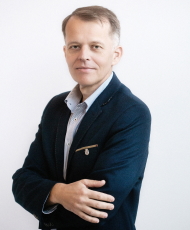After attending one of the Małopolska province’s oldest high schools, M. Wadowita High School in Wadowice, in 1997 graduated with a Master’s degree in history from the Jagiellonian University in Kraków. Completed doctoral studies at the same university, and in 2006 received the degree of Doctor of Humanities in history on the basis of the dissertation “The Czech and German minority in the Kłodzko region in the years 1945-60”. A visiting professor at several universities: Technische Universität in Chemnitz (Germany), Matej Bel University in Banská Bystrica, the University of Presov (both Slovakia), and Peter Pazmany Catholic University in Piliscsaba (Hungary). Has also completed research internships in Chemnitz and at the Liechtenstein Institut. His research interests include issues related to political systems, foreign and domestic policy of European micro-states and Central European countries (especially the Czech Republic, Slovakia, Germany) as well as the process of EU enlargement towards the Balkans. He has held scholarships from Erasmus (studies in Heidelberg), DAAD (stay at Ruhr-Universität in Bochum), SYLLF (research in Polish and Czech archives) and the Scholarship and Training Fund of the European Economic Area Financial Mechanism and the Norwegian Financial Mechanism (research stays in Liechtenstein).
K. Koźbiał, “Polityczne i społeczne konsekwencje zjednoczenia dla wschodnich krajów związkowych RFN. Próba bilansu 30 lat” [Political and social consequences of reunification for the Eastern federal states of Germany. An attempt at assessment of the last 30 years], Przegląd Zachodni 2020, no 2, pp. 125-142.
K. Koźbiał, “Znaczenie eurosceptycyzmu na scenie politycznej Republiki Czeskiej. Uwarunkowania i konsekwencje” [The importance of euroscepticism in the political scene of the Czech Republic. Determinants and consequences], Politeja 2020, no 3, pp. 261-276.
K. Koźbiał, “Alternatywa dla Niemiec – populistyczne ugrupowanie jako zagrożenia dla stabilności systemu politycznego Niemiec” [Alternative for Germany - populist group as a threat to the stability of the German political system] [in:] H. Chałupczak, K. Marzęda-Młynarska, M. Pietraś, R. Suduł (eds), Zagrożenia bezpieczeństwa w procesach globalizacji, Zagrożenia polityczne, UMCS Publishing House, Lublin–Zamość 2020, pp. 363-380.
K. Koźbiał, “Direct democracy in the political system of the Czech Republic. Current status and prospects for the future”, Political Preferences 2018, vol. 21, pp. 17-27.
K. Koźbiał, “Collective memory about the past and multiculturalism”, [in:] Z. Mach (ed.), Local Community, Power and European Integration, Peter Lang, Frankfurt/M 2017, pp. 63-78.
K. Koźbiał, “Women’s participation in political bodies at the central level in the Visegrad Group Countries”. [in:] M. Musiał-Karg, E. Lesiewicz (eds), Women’s role and their participations in public life of the Visegrad Countries, UAM Publishing House, Ústi nad Labem 2016, pp. 49-58.
K. Koźbiał, “Kryzys demokracji na wschodzie? Frekwencja wyborcza w nowych krajach związkowych RFN 25 lat po zjednoczeniu” [Crisis for democracy in the East? Voter turnout in the new federal states of Germany 25 years after reunification], Athenaeum. Polskie Studia Politologiczne” 2016, no 49, pp. 138-153.
K. Koźbiał, “Relations Vaduz - Bern and the Participation of Liechtenstein in the European Integration Process. Possible Scenarios for the Future”, Politické vedy 2015, no 4, Univerzita Mateja Bela, Banska Bystrica, pp. 127-142.
K. Koźbiał, System polityczny Księstwa Liechtensteinu [Political system in the Principality of Liechtenstein], Jagiellonian University Press, Kraków 2013, p. 232.
K. Koźbiał, M. Góra (eds), Demokracja bezpośrednia. Szwajcarska demokracja modelem dla XXI wieku? Wydawnictwo Semper, Warszawa 2011, p. 168.
Polska lokalna wobec integracji europejskiej - dekada doświadczeń” [Local Poland and European integration - a decade of experience], NCN (Opus), 2012-2015. Member of research team.
Polityka zagraniczna Liechtensteinu” [Liechtenstein’s Foreign Policy], Fundusz Stypendialny i Szkoleniowy Mechanizmu Finansowego Europejskiego Obszaru Gospodarczego i Norweskiego Mechanizmu Finansowego. Projekt prowadzony w archiwum w Vaduz i w Liechtensteinie – Institut w Bendern, 2011. Project conducted at the Vaduz archive and Liechtenstein Institute in Bendern. Project Manager.
Liechtenstein w XX wieku. Państwo – polityka – społeczeństwo” [Liechtenstein in the 20th Century. State - politics - society], Fundusz Stypendialny i Szkoleniowy Mechanizmu Finansowego Europejskiego Obszaru Gospodarczego i Norweskiego Mechanizmu Finansowego. Projekt prowadzony w archiwum w Vaduz i w Liechtensteinie – Institut w Bendern, 2009. Project conducted at the Vaduz archive and Liechtenstein-Institut in Bendern. Project Manager.
Mniejszość niemiecka i czeska na Ziemi Kłodzkiej w latach 1945-1960 [The German and Czech minority in Kłodzko County in the years 1945-1960] SYLFF -The Ryoichi Sasakawa Young Leaders Fellowship Fund, 2002–2003. Project Manager.


